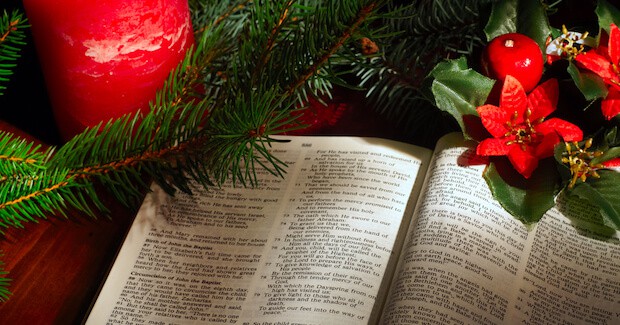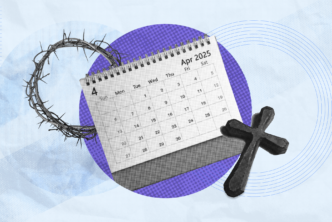What do you think is the most “Christmasy” book in the New Testament?
The obvious frontrunners are Matthew and Luke, especially their opening portions. One of the reasons these books will show up so often in Christmas-time sermons and Bible studies is that they were so self-conscious in their desire to continue the story of Israel begun in the Old Testament. Think of the way the words of Mary and Zechariah in Luke 1 both refer back to God’s promises to Abraham.
They knew their Bibles. They knew to anticipate the advent of a Messiah, though neither could have possibly known the role they would individually play in that coming.
That’s why Christmasy books such as Matthew include special quotations from the Old Testament:
Behold, the virgin shall conceive and bear a son, and they shall call his name Immanuel” (which means, God with us). (Matt 1:23; cf. Isa 7:14)
But if self-conscious continuation of the Old Testament story is what makes a book Christmasy, there’s another New Testament book that needs to be discussed. It’s a book that focuses heavily on Jesus and shows how the Old Testament pointed forward to his coming. I encourage you to consider using this book in your Christmas sermons and lessons this year, even in your personal advent Bible reading. It’s the book of Hebrews.
This video will show you how to explore the connections in Hebrews between the Old and New Testaments. Stick around after the video to talk through some specific examples.
Psalm 110 and Christ’s first advent
Hebrews includes a whopping ten references to Psalm 110, seven of which refer to Jesus.
A little Hebrew knowledge is key to interpreting this psalm, specifically the all-important opening line of verse 1—which just so happens to be the most quoted Old Testament verse in the New Testament.
The LORD says to my Lord:
“Sit at my right hand,
until I make your enemies your footstool.”
In Psalm 110:1 we find two Lords. One is referred to as Yahweh (יהוה). By a tradition that goes back at least to Luther, this covenant name of God (cf. Isa 42:8a) is translated with “LORD” in all caps. The other is referred to as Adonai, and by that same tradition, it is translated with “Lord” in title case. This word can refer to human lords and masters (see Isa 24:2b).
So in Psalm 110:1, “the LORD says to my Lord” is, in Hebrew, “Yahweh says to my Adonai.”
Unquestionably, this first LORD is the creator-God himself, the Holy One of Israel. But who is the second “Lord”?
To answer that question, notice what Yahweh says to David’s Adonai: Yahweh promises this Lord the place of honor at his right hand, and then urges/promises him, “Rule in the midst of your enemies!” Who does that sound like? Who gets to sit next to God’s throne and gets to himself be a king?
When David wrote this psalm he could not have known quite how Yahweh would use David’s own lineage to bring about this rule. He couldn’t have known the role Christmas would play in bringing God’s anointed King.
Christ as King
Evangelical Christians tend to think of Christ’s incarnation, entirely properly, as bringing salvation. The one inspired interpreter of the incarnation who had the closest connection to it, Mary herself, opened her beautiful Magnificat with praise to God her “Savior” (Lk 1:47). Later, at the beginning of Luke’s Gospel, Zechariah praises God for “rais[ing] up a horn of salvation for us in the house of his servant David” (Lk 1:69).
But both Mary and Zechariah also saw political significance in Christ’s first advent. The salvation they saw—and this is especially true of Zechariah’s prayer—was not merely spiritual. Mary prays, “He has brought down the mighty from their thrones” (Lk 1:52). And look at how Zechariah defines “salvation” as he continues his prayer:
Blessed be the Lord God of Israel, for he has visited and redeemed his people and has raised up a horn of salvation for us in the house of his servant David, as he spoke by the mouth of his holy prophets from of old, that we should be saved from our enemies and from the hand of all who hate us.
When Zechariah said “salvation” in that prayer, he meant physical deliverance “from the hand of all who hate us.” Mary and Zechariah saw through prophetic eyes that Jesus would rule, that he would be King.
Back to Psalm 110
This brings us back to Psalm 110, and quotations of it in the book of Hebrews. Mary and Zechariah (and many faithful children of Abraham before them) looked forward to Christ’s coming with eager anticipation—and so should we. As we remember Christ’s first advent this Christmas season, we should stoke our anticipation of his second advent. We need salvation from our enemies and from the hand of all who hate us, too—even as we pray that they will share in the gracious salvation we enjoy. And though Christ is now ruling in the midst of his enemies (Psalm 110:2), we must long for the day when the LORD will say to our Lord Jesus Christ, “I have now finally made your enemies a footstool for your feet” (Psalm 110:1; cf. 1 Cor 15:24–26).
The incarnation marks the first scene in the climactic act of God’s redemptive drama. It is right to celebrate that scene. But Mary and Zechariah knew what we ought to know, that there is more work for the Christ to do.
This Advent, revel in the rich interplay of Old Testament and New Testament themes the season affords us.






